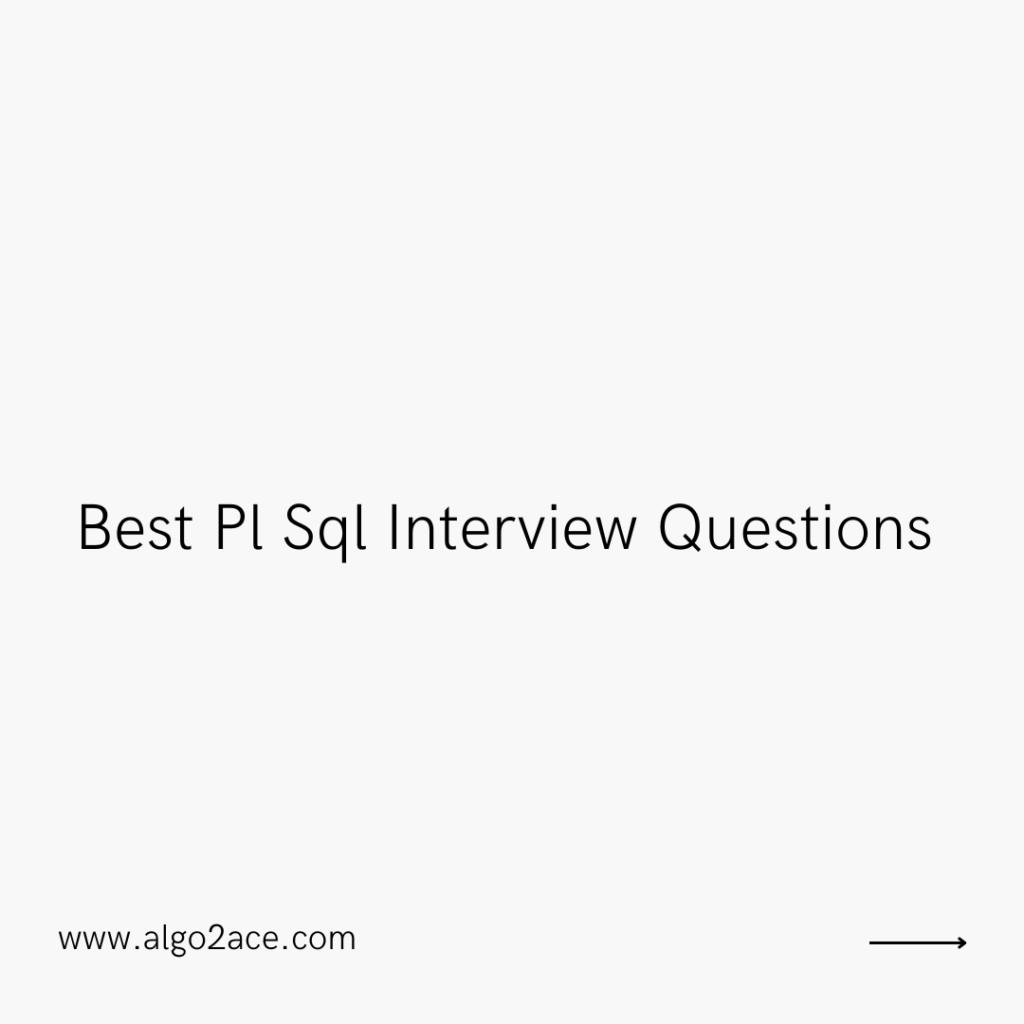Introduction:
Welcome to our new blog on Pl Sql Interview Questions.here we will discuss all the interview questions asked in the interivew.
PL/SQL, or Procedural Language/Structured Query Language, is a powerful extension of SQL developed by Oracle Corporation. It facilitates the integration of procedural constructs with SQL statements, allowing developers to create robust and efficient database applications. PL/SQL is widely used for tasks such as creating stored procedures, functions, triggers, and packages within the Oracle Database. In the context of interviews, understanding PL/SQL concepts is crucial for database developers and administrators seeking roles that involve Oracle database management. This set of interview questions aims to explore the depth of candidates’ knowledge in PL/SQL, covering topics such as exception handling, cursors, transactions, and more.
Pl Sql Interview Questions

1. What is PL/SQL?
PL/SQL is Oracle’s Procedural Language extension for SQL. It allows developers to combine SQL statements with procedural constructs, enabling the creation of stored procedures, functions, triggers, and more within the Oracle Database.
2. Explain the difference between a stored procedure and a function in PL/SQL.
A stored procedure does not return a value, whereas a function must return a value.
Functions can be used in SQL queries, whereas stored procedures cannot be used directly in this manner.
3. How do you handle exceptions in PL/SQL?
Exceptions in PL/SQL can be handled using the `EXCEPTION` block. The `RAISE` statement is used to raise an exception, and `EXCEPTION WHEN` is used to catch specific exceptions.
4. What is a cursor in PL/SQL?
A cursor in PL/SQL is a pointer or a handle to the result set of a SQL query. It allows developers to process each row individually within a result set.
5. Explain the difference between %ROWTYPE and %TYPE in PL/SQL.
`%ROWTYPE` is used to declare a record that has the same structure as a table or cursor.
`%TYPE` is used to declare a variable with the same data type as a specified database column.
6. What is a trigger in PL/SQL, and when is it executed?
A trigger is a set of instructions that are automatically executed or fired in response to certain events on a particular table or view. Triggers can be executed before or after an event (e.g., before an insert or after an update).
7. How do you handle transactions in PL/SQL?
Transactions in PL/SQL are managed using the `COMMIT` and `ROLLBACK` statements. The `COMMIT` statement is used to make changes permanent, while the `ROLLBACK` statement is used to undo changes.
8. Explain the purpose of the `PRAGMA AUTONOMOUS_TRANSACTION` in PL/SQL.
This pragma is used to mark a PL/SQL block of code as an autonomous transaction, meaning that it can be committed or rolled back independently of the main transaction.
9. What is a package in PL/SQL?
A package is a schema object that groups logically related PL/SQL types, variables, and subprograms. It provides a way to encapsulate and organize code for better maintainability and reusability.
10. How can you handle NULL values in PL/SQL?
NULL values can be handled using the `IS NULL` or `IS NOT NULL` conditions. Additionally, the `NVL` function can be used to replace NULL with a specified default value.
Reference:
Read More Blogs:
Conclusion:
In conclusion, proficiency in PL/SQL is a valuable skill for individuals involved in Oracle database development and administration. The ability to leverage PL/SQL for creating efficient stored procedures, managing transactions, and handling exceptions is fundamental to ensuring the optimal performance and reliability of Oracle databases. As organizations continue to rely on Oracle technologies, candidates equipped with a strong understanding of PL/SQL concepts are well-positioned to contribute effectively to database management and application development. The interview questions provided serve as a comprehensive guide for candidates looking to showcase their expertise and excel in PL/SQL-focused interviews

I loved you even more than you’ll say here. The picture is nice and your writing is stylish, but you read it quickly. I think you should give it another chance soon. I’ll likely do that again and again if you keep this walk safe.
Thank you for taking the time to share your thoughts and for being a part of our community. We look forward to serving you even better in the future.
I simply could not go away your web site prior to suggesting that I really enjoyed the standard info a person supply on your guests Is going to be back incessantly to investigate crosscheck new posts
Thank you for taking the time to share your thoughts and for being a part of our community. We look forward to serving you even better in the future.
Usually I do not read article on blogs however I would like to say that this writeup very compelled me to take a look at and do so Your writing taste has been amazed me Thanks quite nice post